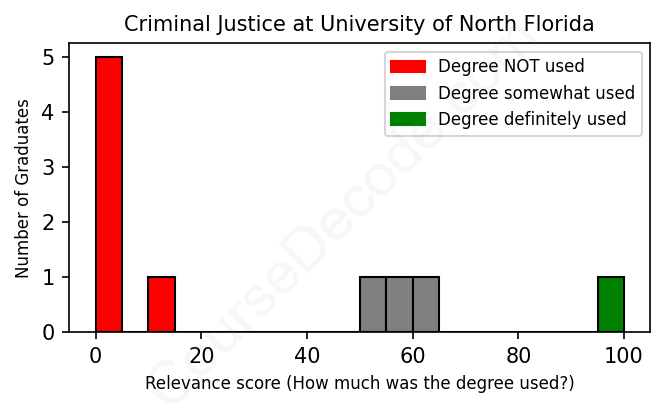
First, some facts. Of the Criminal Justice graduates from University of North Florida we've analyzed , here's how many have used (or NOT used) their degree in their career:

These are estimates based on AI analysis of 10 LinkedIn profiles (see below).
The verdict? Horrible! Overall, with an average relevance score of 28%, Criminal Justice graduates from University of North Florida have an exceptionally lower likelihood (-39%) of finding work in this field compared to the average graduate across all fields:
And for comparison, here's the chart for all profiles we've looked at across all degrees.
Also, after graduating, only 20% of these graduates have pursued further education other than another Bachelor's degree (such as a Masters degree or other), compared to the average across all profiles of 35%. This suggests a Bachelors degree is enough for most Criminal Justice graduates, and it's normal to look for work straight after graduation.
See the details:
|
Relevance score: 0% We think this person has NOT gone into a career related to their degree. We think this person has NOT gone into a career related to their degree.
DEGREE INFOGraduated in 2013 from University of North Florida with a Bachelor's Degree in Criminal Justice. No other secondary education since. JOB HISTORY SINCE GRADUATIONClaims Adjuster Suddath Relocation Systems May 2013 - Present ABOUTNo information provided. |
The top 10 most common jobs done by the graduates we've analyzed (ranked most common to least) are:
Looking at the job history of people who graduated with a Criminal Justice degree from the University of North Florida, it seems they've taken on a mix of roles, though not all stay close to the core of criminal justice. Common jobs among these alumni included roles like Judicial Externs, Legal Interns, and positions within public defender's offices, all of which are directly connected to the field. These positions utilize the knowledge and skills learned during their studies, making them quite relevant for those pursuing careers in the legal system or law enforcement.
However, there's also a noticeable trend of graduates moving into fields that don’t really tap into their criminal justice knowledge. Positions like HR Managers, Teachers, and various roles within retail or environmental management seem to drift away from the core tenets of the degree. While some of these jobs can share skills like compliance or understanding of the law, they typically don’t leverage the specific expertise students acquire in their criminal justice programs. So, in short, while many graduates start off grounded in criminal justice roles, a fair number end up in careers that are relatively disconnected from the field.
Here is a visual representation of the most common words in job titles for Criminal Justice graduates (this is across all Criminal Justice graduates we've analyzed, not just those who went to University of North Florida):

From analyzing the career trajectories of Criminal Justice graduates from the University of North Florida, it seems that many of them start off by diving into positions that are fairly relevant to their field, especially early on. Graduates often take internships or entry-level roles in legal settings, such as judicial externs or positions within public defender's offices. However, as time goes on, a noticeable shift starts to occur. Some alumni transition to seemingly unrelated fields, such as HR or education, where they may not utilize their criminal justice background as effectively. For example, several have become teachers or taken on significant roles in corporate settings, such as HR management, which, while valuable, don’t directly align with their degrees.
Fast forward five to ten years later, and the picture becomes a bit more varied. While some do stick to roles in the criminal justice realm or related fields, like conservation officers or juvenile detention officers, others have branched out into completely different careers, like claims adjusters or project managers in environmental sectors. The success stories are there, especially for those who found niches in government or legal professions, but for others, it’s a mixed bag where they may end up in careers outside of Criminal Justice that don’t fully capitalize on their education. So, while there are solid opportunities out there, not every grad has ended up on a path that keeps them firmly in the Criminal Justice field.
Getting a Bachelor’s degree in Criminal Justice at the University of North Florida, or pretty much anywhere else, can be considered a bit easier than some other majors. While you have to read a bunch of case studies, write papers, and take exams on things like criminal law and ethics, the material is usually pretty interesting, which helps keep you engaged. You’ll definitely have some challenging moments, especially when it comes to research projects or understanding complex legal concepts, but overall, it tends to be more manageable compared to degrees in fields like engineering or the sciences. If you're genuinely interested in the subject matter, you'll find yourself enjoying it more than stressing out, and your professors are usually pretty supportive too!
Most commonly, in the LinkedIn profiles we've looked at, it takes people 4 years to finish a Bachelor degree in Criminal Justice.
Alright, so let’s break it down! Generally, some of these folks seem to be hustling for decent pay, especially the ones who moved into corporate roles or legal positions. The grad from 2010 who climbed up to Corporate Counsel likely earns a solid salary, since legal jobs usually pay well. Meanwhile, the teachers and a few others in more service-oriented jobs probably don't see paychecks as high. The ones in education seem to be stuck in a more modest income bracket, which is pretty typical. So, while some are definitely making bank, others are still figuring it out, earning average salaries that are common in their fields. Overall, it’s a mixed bag, but those in higher-level positions seem to be doing alright!
Here is a visual representation of the most common words seen in the "about" section of LinkedIn profiles who have a Bachelor degree in Criminal Justice (this is across all Criminal Justice graduates we've analyzed, not just those who went to University of North Florida). This may or may not be useful:

Here are all colleges offering a Bachelor degree in Criminal Justice (ordered by the average relevance score of their Criminal Justice graduates, best to worst) where we have analyzed at least 10 of their graduates: